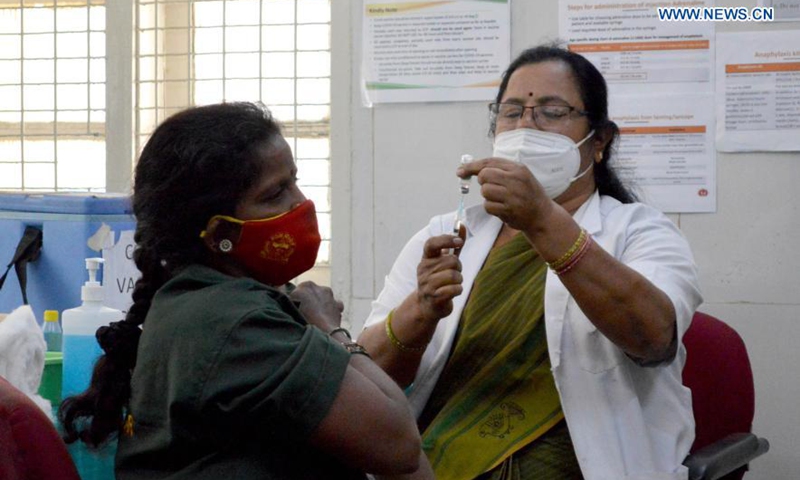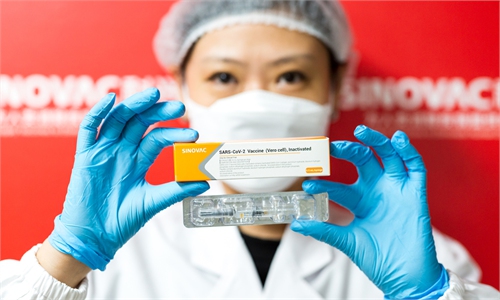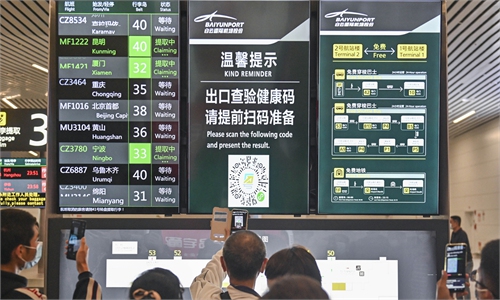COMMENTS / EXPERT ASSESSMENT
India cuts short vaccine exports in a rush to stymie domestic outbreak

A woman receives a dose of COVID-19 vaccine during the vaccination drive in Bangalore, India, Feb. 12, 2021.(Photo:Xinhua)
Amid a new wave of COVID-19 resurgence across the world, daily confirmed cases in India have hit records in the past week. Indian authorities reportedly halted vaccine exports in order to speed up inoculation at home, which, from another perspective, offers a lesson for some Indian politicians who have been hyping “vaccine diplomacy” that vaccine export should not be politicized.
After shipping over 64 million doses of COVID-19 vaccines overseas, Indian authorities decided to halt exports now. Dozens of countries may be affected, RFI reported. The country registered over 125,000 new infections on Friday and more than 145,000 cases on Saturday.
As a large vaccine manufacturing power, India’s supply to the world should be praised, especially its contribution to the COVAX program. However, those media outlets and politicians in India hyping the so-called vaccine diplomacy, especially as a method of geopolitical competition with China, should reflect on their skewed aims.
Since the early outbreak in India last January, the populous country, despite implementing rounds of containment measures, has not put the outbreak under control effectively. With a colossal population, insufficient medical supplies, unsatisfactory sanitary conditions and even anti-science prevention measures circulating among its citizens, the largest South Asian country seems to be unable to avoid the mass spread of the virus.
However, the country has put the cart before the horse. Rather than focusing on epidemic containment, India, by playing opportunism, triggered rounds of disputes with its neighbors, including China.
Besides the ill-intentioned provocation at the borders, New Delhi also stepped up its efforts in trying to decouple China economically last year, which has only proved futile as China again became its largest trading partner in 2020.
After enduring the pandemic for over a year, the world has entered a bumpy recovery era with vaccines hitting markets. Though it’s expected that India can join hands with others to raise vaccine accessibility and affordability for the world, it’s regrettable to see that certain forces in India simply cannot give up politicizing its vaccine exports.
The latest export suspension is a slap in the face of those Indian forces hyping vaccine diplomacy, as well as in the face of the Quad dialogues led by the US. Under the framework, India, Japan and Australia earlier proposed a so-called Supply Chain Resilience Initiative, which has been widely regarded as a move to decrease reliance on China or even build a new supply chain without China.
Not only does India need to better measure its capacity in vaccine production and export, the same logic also applies to India’s role in the global value chain. Even with Quad’s verbal support, India is incapable of replacing China, the world’s largest manufacturing power, in the foreseeable future. What’s crucial for India is to first enhance its position by shoring up infrastructure, fostering more skilled labor, improving governmental efficiency and better integrating into the regional economic structure.
Compared to the hollow Quad industrial chain initiative, what is reliable and promising is the economic complementarities between China and India. Instead of further tying itself to the US’ chariot to confront China or involving in other geopolitical games, it’s hoped that New Delhi can stay clear-minded to choose a correct course to the country.
The author is director of Institute of Bay of Bengal Studies with Shenzhen University. bizopinion@globaltimes.com.cn


